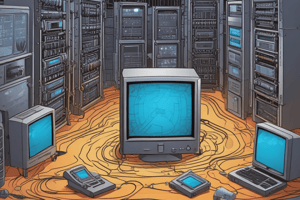Podcast
Questions and Answers
What is the primary function of a gateway?
What is the primary function of a gateway?
- To connect a network to the internet (correct)
- To convert digital signals to analog signals
- To forward data packets between devices
- To connect multiple devices on a network
What is malware?
What is malware?
- A type of network device
- Malicious software that can damage a network (correct)
- A software that blocks unauthorized access
- A type of encryption
What is the purpose of a firewall?
What is the purpose of a firewall?
- To connect multiple devices on a network
- To convert digital signals to analog signals
- To forward data packets between devices
- To block unauthorized access to a network (correct)
What is a switch used for?
What is a switch used for?
What is encryption?
What is encryption?
Study Notes
Computer Networks
Definition and Types
- A computer network is a set of interconnected devices that communicate with each other to share resources and exchange data.
- Types of computer networks:
- LAN (Local Area Network): connects devices in a limited geographical area.
- WAN (Wide Area Network): connects devices over a larger geographical area.
- MAN (Metropolitan Area Network): connects devices in a metropolitan area.
- WLAN (Wireless Local Area Network): connects devices wirelessly.
- Wi-Fi: a type of WLAN that uses radio waves to connect devices.
Network Topology
- Physical topology: the physical arrangement of devices and connections.
- Logical topology: the way data is transmitted and received.
- Common network topologies:
- Bus topology: a single cable connects all devices.
- Star topology: devices connect to a central hub or switch.
- Ring topology: devices connect in a circular configuration.
- Mesh topology: each device connects to every other device.
Network Protocols
- Communication protocols that govern data transmission and reception.
- Common network protocols:
- TCP/IP (Transmission Control Protocol/Internet Protocol): the most widely used protocol suite.
- HTTP (Hypertext Transfer Protocol): used for transferring data over the internet.
- FTP (File Transfer Protocol): used for transferring files over the internet.
- DNS (Domain Name System): used for resolving domain names to IP addresses.
Network Devices
- Devices that facilitate communication between devices on a network:
- Hub: a simple device that connects multiple devices.
- Switch: a device that connects multiple devices and forwards data packets.
- Router: a device that connects multiple networks and forwards data packets.
- Gateway: a device that connects a network to the internet.
- Modem: a device that converts digital signals to analog signals for transmission over phone lines.
Network Security
- Threats to network security:
- Hacking: unauthorized access to a network.
- Malware: malicious software that can damage a network.
- Viruses: malicious software that replicates itself.
- Firewalls: devices or software that block unauthorized access.
- Encryption: the process of converting data into a code to prevent unauthorized access.
Computer Networks
- A computer network is a set of interconnected devices that communicate with each other to share resources and exchange data.
Types of Computer Networks
- LAN (Local Area Network) connects devices in a limited geographical area.
- WAN (Wide Area Network) connects devices over a larger geographical area.
- MAN (Metropolitan Area Network) connects devices in a metropolitan area.
- WLAN (Wireless Local Area Network) connects devices wirelessly.
- Wi-Fi is a type of WLAN that uses radio waves to connect devices.
Network Topology
- Physical topology refers to the physical arrangement of devices and connections.
- Logical topology refers to the way data is transmitted and received.
- Bus topology consists of a single cable that connects all devices.
- Star topology consists of devices connected to a central hub or switch.
- Ring topology consists of devices connected in a circular configuration.
- Mesh topology consists of each device connected to every other device.
Network Protocols
- TCP/IP (Transmission Control Protocol/Internet Protocol) is the most widely used protocol suite.
- HTTP (Hypertext Transfer Protocol) is used for transferring data over the internet.
- FTP (File Transfer Protocol) is used for transferring files over the internet.
- DNS (Domain Name System) is used for resolving domain names to IP addresses.
Network Devices
- Hub is a simple device that connects multiple devices.
- Switch is a device that connects multiple devices and forwards data packets.
- Router is a device that connects multiple networks and forwards data packets.
- Gateway is a device that connects a network to the internet.
- Modem is a device that converts digital signals to analog signals for transmission over phone lines.
Network Security
- Hacking is unauthorized access to a network.
- Malware is malicious software that can damage a network.
- Viruses are malicious software that replicates itself.
- Firewalls are devices or software that block unauthorized access.
- Encryption is the process of converting data into a code to prevent unauthorized access.
Studying That Suits You
Use AI to generate personalized quizzes and flashcards to suit your learning preferences.
Description
Learn about the definition of computer networks and the different types of networks, including LAN, WAN, MAN, and WLAN.




